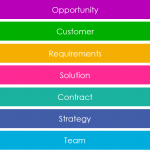
There is a widespread debate at present about what business to business (B2B) solution selling might look like in a few years’ time and what the ramifications are for sales professionals operating in this field. The major trend underpinning this thinking is the shift of power away from the product or vendor salesperson to the customer, enabled by the vast amount of high-quality information readily available online or through a range of relevant discussion groups and forums. If this trend continues, the protagonists argue, then the traditional B2B sales role will disappear and be replaced by a more transactional approach. Therefore, mature sales professionals will need to re-invent themselves in order to survive, and those entering the job market now will need to acquire a whole new skill set that is still evolving. It sounds scary and it is. So, what can you do about it if you are currently riding high as a commissioned, target driven sales jock?

 Why did we create the Essential Sales Process (ESP)? Well the answer is that myself, and the other co-creators of ESP, have worked in solution selling for most of our careers, and we felt that most of the available solution selling processes on offer didn’t work very well. They tend to be very linear, and assume a “happy day” scenario where everything goes according to plan, and we always have control over what the customer does, and what the competition does.
Why did we create the Essential Sales Process (ESP)? Well the answer is that myself, and the other co-creators of ESP, have worked in solution selling for most of our careers, and we felt that most of the available solution selling processes on offer didn’t work very well. They tend to be very linear, and assume a “happy day” scenario where everything goes according to plan, and we always have control over what the customer does, and what the competition does.  Improving win rate and accelerating deals requires that we have an accurate understanding of where we are with any given opportunity, so we can effectively plan next steps to advance the deal towards closure. Think of this as your “Sat Nav” for sales opportunities.
Improving win rate and accelerating deals requires that we have an accurate understanding of where we are with any given opportunity, so we can effectively plan next steps to advance the deal towards closure. Think of this as your “Sat Nav” for sales opportunities.  Having a good sales process helps the sales team qualify, plan and track their opportunities, supports accurate and consistent forecasting, and ultimately helps drive up win rates and revenues. However, many traditional sales processes remain unpopular with sales people as they are seen as too heavyweight, don’t match the way that teams actually sell, and lack the inherent agility to truly support them in their endeavours.
Having a good sales process helps the sales team qualify, plan and track their opportunities, supports accurate and consistent forecasting, and ultimately helps drive up win rates and revenues. However, many traditional sales processes remain unpopular with sales people as they are seen as too heavyweight, don’t match the way that teams actually sell, and lack the inherent agility to truly support them in their endeavours.  As solution sellers we all want to increase our win rate, our deal size, and get deals closed faster. We also need to provide accurate forecasts to our sales leaders, all with the minimal amount of admin. To do this we need to ensure we are qualifying well and focusing on the right deals. Our sales process should help us with all these things, and not get in the way by creating excessive process overhead.
As solution sellers we all want to increase our win rate, our deal size, and get deals closed faster. We also need to provide accurate forecasts to our sales leaders, all with the minimal amount of admin. To do this we need to ensure we are qualifying well and focusing on the right deals. Our sales process should help us with all these things, and not get in the way by creating excessive process overhead.  Most people in sales would agree that having a process is a good thing. A good process provides guidance for sellers and enables some governance around the sales effort: knowing where we are, where we are headed, and what we should be doing next. Ultimately this helps the sales team be more effective, win more deals, drive up revenue etc. However, traditional sales processes in use in many, if not most, organisations today fall far short of this. In this post I will introduce three ideas which can help and offer ways to improve:
Most people in sales would agree that having a process is a good thing. A good process provides guidance for sellers and enables some governance around the sales effort: knowing where we are, where we are headed, and what we should be doing next. Ultimately this helps the sales team be more effective, win more deals, drive up revenue etc. However, traditional sales processes in use in many, if not most, organisations today fall far short of this. In this post I will introduce three ideas which can help and offer ways to improve: